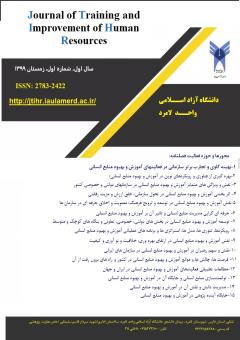A Competency Model of Banking Branch Manager with an Agile Approach: A Study with a Qualitative Approach
Subject Areas : title1Hamid Seidi Samani 1 , Vedadi Ahmad 2 * , Alireza Amirkabiri 3
1 - دستیار آموزشی
2 - Department of public management, IAUCTB, Tehran, IRAN
3 -
Keywords: Competence of managers, agility, banking industry,
Abstract :
Meritism is one of the issues of human resources management that is raised at different levels of organizations. Meritism affects the selection of people to perform certain tasks. Since human power is one of the most important capitals of any organization and plays a key role in the success of the organization, human resources activities can have a great impact on the organization's agility. be with a merit approach. For this purpose, the research literature and the background of the research were reviewed first, and then the theoretical framework of the research was formulated based on the semi-structured interview with 15 experts in the field of banking who were selected from three private banks. Based on the interviews and the use of thematic analysis about them, the research framework was formed. Next, in order to validate the final framework, 285 personnel were selected as non-probability sampling and questionnaires whose validity and reliability were confirmed were distributed among these people and due to the non-normality of the data distribution, using the method Partial least squares and SmartPLS2 software were used for statistical analysis. Based on the mean values, the research model was generally confirmed. According to the analysis, the factors in four categories "individual competences", "interpersonal competences", "organizational competences" and "environmental competences" are grouped according to the path coefficients of the most important organizational competences. were diagnosed.
آریان، عاطفه؛ 1389؛ معرفی روش تحقیق کیفی- نظریه مبنایی؛ کتاب ماه علوم اجتماعی؛ شماره 25؛ 86-95
اسدی فرد، رویا؛ 1395؛ مدل شایستگی مدیران دولتی ایران (بر اساس صحیفه امام "ره") رویکرد استراتژی تئوری داده بنیاد؛ استاد راهنما: احمدعلی خائف الهی؛ دانشگاه تربیت مدرس؛ دانشکده علوم انسانی؛ پایان نامه کارشناسی ارشد
امیرکبیری، علی رضا؛ 1374؛ سازمان و مدیریت ( روی آوری نظام گرایانه و اقتضایی)؛ نشر هور؛ چاپ اول
تصدیقی، محمدعلی؛ 1399؛ موانع توسعه شایسته سالاری در اندیشه دینی و نحوه استفاده از منابع قدر ت در بین مدیران شایسته و نالایق؛ مجموعه مقالات اولین همایش توسعه شایسته سالاری در سازمان ها؛ تهران
دانایی فرد، حسن؛ الوانی، سیدمهدی؛ آذر، عادل؛ 1386؛ روش شناسی پژوهش کیفی در مدیریت: رویکردی جامع ؛ انتشارات صفار؛ چاپ دوم
دانایی فرد، حسن؛ مظفری، زینب؛ 1398؛ ارتقاء روایی و پایایی در پژوهش های کیفی مدیریتی : تاملی بیر استراتژی های ممیزی پژوهشی؛ پژوهش های مدیریت؛ شماره اول؛ 131-162
زارعی متین، حسن؛ 1382؛ مبانی سازمان و مدیریت (رویکرد اقتضایی)؛ موسسه انتشارات و چاپ دانشگاه تهران؛ چاپ دوم
زاهدی، شمس السادات؛ 1392؛ گونه شناسی نظام های حکومتی و مدیریتی؛ انتشارات مهکامه
عابدیان اول، اکرم؛ 1399؛ طراحی مدل شایستگی مدیران گروه های آموزشی دانشگاه فردوسی مشهد؛ استاد راهنما: مرتضی کرمی؛ دانشگاه فردوسی مشهد؛ پایان نامه کارشناسی ارشد
فرجی سبکبار، حسنعلی؛ بدری، سیدعلی؛ مطیعی لنگرودی، سیدحسن؛ شرفی، حجت الله ؛ 1399؛ سنجش میزان پایداری نواحی روستایی بر مبنای مدل تحلیل شبکه با استفاده از تکنیک بردا؛ مطالعه موردی نواحی روستایی شهرستان فسا ؛ پژوهش های جغرافیای انسانی؛ شماره 72
فرهی بوزنجانی، برزو؛ 1400؛ معرفی الگوی توسعه توانایی های مدیریتی مورد نیاز مدیران(نظام اداری کشور)؛ نشریه دانش مدیریت؛ شماره 68
مالمون، زینب؛ 1396؛ بررسی شایستگی های مدیران بیمارستان های آموزشی دانشگاه علوم پزشکی ایران بر اساس مدل بازخور 360 درجه؛ استاد راهنما: سوگند تورانی؛ دانشگاه علوم پزشکی تهران
Abraham, S.E., Karns, L.A., Shaw, K., and Mena, M.A., (2020), Managerial competencies and the managerial performance appraisal process, Journal of Management Development, Vol. 20, No. 10, pp.842-852 Athey, T. R., & Orth, M. S. (2019). Emerging competency methods for the future. Human Resource Management, Vol.38, No. 3, pp. 215-226. Brennan, M., Lewis, T., & konkel. S. (2023). A Competence-based Curriculum for Environmental Health. Paper presented at the Chartered institute of enviromental health Cardy, R.L. and Selvarajan, T.T. (2016), Competencies: Alternative frameworks for competitive advantage, Business Horizons, Vol. 49, pp. 235-245 Dubois, D.D. (Ed.) (2019), “Preface”, The Competency Casebook: Twelve Studies in Competency-Based Performance Improvement, HRD Press, Amherst, MA. Ekvall, G. and Arvonen, J. (2016), "Change-centered leadership: an extension of the twodimensional model", Scandinavian Journal of Management, Vol. 7 No. 1, pp. 17-26. Fang, C.H., Chang, S.T., and Chen, G.L. (2015), Competency development among Taiwanese healthcare middle manager: A test of the AHP approach, African Journal of Business Management Vol. 4, No. 13, pp. 2845-2855 Klagge, J. (2018), "Self-perceived development needs of today's middle managers", The Journal of Management Development, Vol. 17 No. 7, pp. 481-92. Lengnick-Hall, M. Lengnick-Hall, C. Andrade, L. Drake, B. (2019), Strategic human resource management: The evolution of the field, Human Resource Management Review, Vol. 19, pp.64-85 Mu¨ller, R. and Turner, R. (2010), Leadership competency profiles of successful project managers, International Journal of Project Management, Vol. 28, PP. 437–448 Patanakul, P. and Milosevic,D. (2018), A competency model for effectiveness in managing multiple projects, Journal of High Technology Management Research, Vol. 18, pp. 118-131 Raybould, M., Wilkins, H., (2015). Over-qualified and under-experienced: turning graduates into hospitality managers. International Journal of Contemporary Hospitality Management. Vol. 17, No.3, PP.203–216 Sandwith, P. (2013). A hierarchy of management training requirements: The competency domain model. Public Personnel Management, Vol.22, No.1, PP. 43-62. Shih, H. Sh.; Shyur, H. J. and Lee, E. S. (2017), "An Extension of TOPSIS for Group Decision Making",Mathematical and Computer Modelling, vol.45, pp.801–813 Trivellas, P. Drimoussis, C. (2013), Investigating Leadership Styles, Behavioural and Managerial Competency Profiles of Successful Project Managers in Greece, Social and Behavioral Sciences,vol. 73, PP. 692 – 700 Zopiatis, A. (2017), Is it art or science? Chef’s competencies for success, International Journal of Hospitality Management, Vol.29, PP. 459–467

